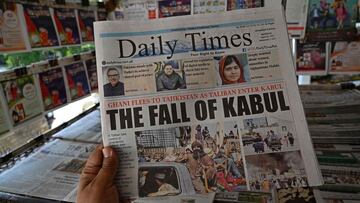What is Afghanistan's situation in the Middle East and which countries does it border?
The Taliban conquest is making the country's neighbors nervous and Afghanistan's new rulers are facing a different strategic situation to 20-years ago.


Centuries ago, the British and Russian empires staged the so-called 'great game' over Afghanistan, due to its strategic positioning between the Middle East, China and India. While those empires may be gone, Afghanistan remains in place and the Taliban will need to contend with new powers such as Iran, Pakistan, and China.
Iran
Iran's President Raisi claimed the US defeat was an "opportunity for lasting peace," in Afghanistan. The exit of a sizeable US military presence so close to home will be welcome for the Iranian government, but there will be difficult negotiations ahead with Afghanistan's new rulers. Importantly, Iran is a Shia Muslim dominated country, and sees itself as the defender of Shia Islam in the region. Afghanistan has a sizeable Shia minority, and the Taliban are of the Sunni sect of Islam. The Taliban policy towards these minorities could prove a barrier to good relations with their western neighbor. Iran has already said they want good ties with the new Afghanistan, a pragmatic move as both countries will try and keep the US out of the region.
We watch in complete shock as Taliban takes control of Afghanistan. I am deeply worried about women, minorities and human rights advocates. Global, regional and local powers must call for an immediate ceasefire, provide urgent humanitarian aid and protect refugees and civilians.
— Malala (@Malala) August 15, 2021
Pakistan
Pakistan and the Taliban have had a close relationship in the past, in which the IRI, Pakistan's version of the CIA, funded the Taliban before they first came to power in 1996. A friendly Afghanistan helps Pakistan in isolating India, their neighbor and regional ally. However, support for the Taliban would distance Pakistan from the US and likely prevent investment in the country. Husain Haqqani, the former ambassador to the US, wrote in Foreign Affairs that "Islamist extremism has already divided Pakistani society along sectarian lines, and the ascendance of Afghan Islamists next door will only embolden radicals at home." The inevitable refugee crisis that will arrive in the following months will be directed toward Pakistan; the countries share a long border which is very porous. Pakistan may want a cozy relationship with the Taliban, but one in which they can exert some influence.
“It is more difficult to free your mind from mental slavery, Afghans have broken the shackles of slavery”, PM Imran Khan pic.twitter.com/zpWr6YTYVh
— Alina Shigri (@alinashigri) August 16, 2021
China
China has already said that they are willing to work with the Taliban, and they would respect the "choices" of the Afghan people.
VIDEO: 🇨🇳🇦🇫 China is ready to deepen "friendly and cooperative" relations with #Afghanistan, a government spokeswoman says, after the Taliban seized control of the country pic.twitter.com/PmaDcyTL7Z
— AFP News Agency (@AFP) August 16, 2021
Related stories
“The situation in Afghanistan has already undergone a major transformation, and we respect the wishes and choices of the Afghan people,” said Hua Chunying, a spokeswoman for China’s foreign ministry. China has shown they will have pragmatic alliances with ideologically opposed parties and with their 'Belt and Road' initiative a key part of Chinese policy, a friendly Afghanistan will be needed to allow an expansion of the project. The initiatve is a Chinese trade and investment plan across the old Silk Road, from China through Central Asia to Turkey and Russia.
Another aspect for China to consider in their relationship with the Taliban is the latter's relationship with China's Uighur Muslim minority. Afghanistan shares a slim border with China, and China has been determined in recent years to break up the separatism in Xinjiang. The Taliban met the Chinese foreign minister, Wang Yi, last month when they came to an agreement that the Taliban would not sponsor terrorism in China.

